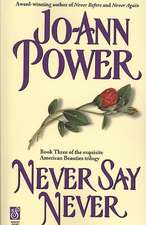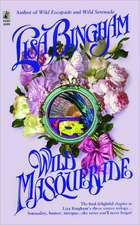My Lady Beloved
Autor Lael St. Jamesen Limba Engleză Paperback – 30 iun 2010
Sweet, sheltered Gabriella Redclift is betrothed to Sir Cyprian Avendall, whom she has met but once. When Gabriella is abducted in the Devonshire countryside en route to her nuptials, her innocence -- and her dream of true love -- hang in the balance.
Morgan Chalstrey is not the rogue bandit that he appears. Seeking vengeance on Avendall for his role in the undoing of Morgan's beloved Rebecca, he means Gabriella no harm; her possible ruin is unavoidable, if unfortunate. But as Gabriella discovers that her fiancé is far from chivalrous, she might become a willing participant in her own corruption. And Morgan, who had sworn off love forever, may find that innocent Gabriella's love, and not revenge, is the one thing worth fighting for.
Preț: 137.07 lei
Nou
Puncte Express: 206
Preț estimativ în valută:
26.23€ • 27.23$ • 21.87£
26.23€ • 27.23$ • 21.87£
Carte disponibilă
Livrare economică 03-17 martie
Preluare comenzi: 021 569.72.76
Specificații
ISBN-13: 9781451611199
ISBN-10: 1451611196
Pagini: 384
Dimensiuni: 127 x 203 x 23 mm
Greutate: 0.35 kg
Ediția:10000
Editura: Gallery Books
Colecția Gallery Books
ISBN-10: 1451611196
Pagini: 384
Dimensiuni: 127 x 203 x 23 mm
Greutate: 0.35 kg
Ediția:10000
Editura: Gallery Books
Colecția Gallery Books
Extras
Chapter 1
Late summer, 1369
St. Swithin's Abbey,
Devonshire, England
The uppermost branches of the oak, a gnarled and venerated tree, ancient of days and fully grown long before the first stones of the abbey's foundation had been laid, rustled beneath the bare and somewhat grubby feet of nineteen-year-old Gabriella Redclift, soon to be Lady Avendall. She peered into the distance, squinting a little, and held her breath, glad her expression was hidden from her sisters, standing below on the path.
"Can you see Sir Avendall and his men?" called Margaret, her twin, who grew vexed if addressed by any name save 'Meg.' Her voice floated up through the green, bristling leaves, high and eager, for she, like everyone else at St. Swithin's, believed the fiction that Gabriella truly wanted the marriage arranged for her, long ago, by their late father. None must ever suspect that she was merely pretending to be pleased, for the sake of her mother and sisters and the crumbling old manor house, Redclift Hall, two days' journey north of the abbey, that was her heart's home. Her body and soul, indeed all she had, were her dowry; Avendall's gold, of which there was a surfeit, would assure Meg and Elizabeth's futures, whether they chose to wed or to take holy vows and remain at the abbey, and Ariel, their ever-fretful mother, would know security and peace at long last.
"In the name of the Holy Mother," lamented sixteen-year-old Elizabeth, no doubt crossing herself as she spoke, for she, with her gentle nature and devout ways, was almost surely destined to take the veil, "do come down, Gabriella, lest you fall..."
Ignoring Elizabeth's plea -- dear Elizabeth, she was forever apprehensive about something -- Gabriella gazed into the distance, beyond the walls of the abbey, at once comforting and confining, searching the horizon for any sign of her bridegroom, come to claim her. Although the weather was already growing cooler, the days moving inexorably toward autumn and then the bitter cold of winter, the late afternoon sun was dazzlingly bright, the sky a heart-pinching blue. Gabriella tried not to think of Redclift Hall, with its fields and meadows and streams shimmering with trout, a place she would most likely never set eyes upon again. Instead, she must fix her thoughts on what lay ahead, forsaking all that lay behind.
"I think I see just a flicker of color on the horizon," she called down to her sisters, clinging to the tree trunk with one arm and shading her eyes with the opposite hand. "Still, I can't be certain -- "
"Come down," Elizabeth reiterated, striking a note of clear desperation." 'Tis sorrow enough that you're leaving us -- I should not be able to bear it if you landed at my feet in a heap of broken bones!"
"Do be still," enjoined Meg, ever impatient with any sign of trepidation, either in herself or in others. She would gladly have climbed to the top of the oak tree personally, if Avendall had been her bespoken husband instead of Gabriella's. It was a bitter if private irony: unlike Gabriella, who wanted only to live at Redclift Hall and cause the place to prosper once more, Meg yearned for romance, adventure, and travel.
"I won't be still," argued Elizabeth, who was a Redclift, after all, and not without spirit, for all her prayers and piety. "I'm the only one here with a grain of common sense!"
It was then that the speck Gabriella had glimpsed on a distant hilltop resolved itself into four horsemen, clad in red and gold -- Sir Avendall's colors.
"There they are," Gabriella said, trying to sound pleased. Instead of the wild, heady delight Meg would have exhibited, she felt a sting of poignant sorrow. Probably before she saw another sunrise, she would be a married woman, and on her way to live out her days on Avendall's Cornish estate. Redclift Hall, her sisters, the abbey -- everyone she loved and everything she knew -- were already slipping away, soon to be lost.
She swallowed hard, and blinked back tears.
"Hurry, then," Meg called up to her, breathless with anticipation. "I shall brush and plait your hair -- I'll weave the crimson ribbon through -- and Elizabeth will lay out your good velvet gown."
"We shall have to do something about those feet," Elizabeth said plaintively, as Gabriella began making her way back to the ground, moving deftly from branch to branch. "And I'm sure your kirtle is covered with wood sap -- "
"Don't fuss," scolded Meg, but good-naturedly. "After all, this may be Gabriella's wedding day, and we should all be positively delirious with joy -- shouldn't we?"
As Gabriella dropped from the lowest limb to land on her feet, facing her sisters, she saw, with dread, that Elizabeth's wide brown eyes were brimming with tears. "I know I should be happy," the youngest sister blurted out, "but I'm not. Gabriella is going away. Far away."
"Goose," Meg said affectionately, putting an arm around Elizabeth's fragile shoulders and giving her a quick squeeze. "You know Gabriella will send for us, once she's settled in her new home. She'll see that you and I have husbands -- just like we planned. Mine will be an adventurer -- perhaps a seagoing man -- and yours, Elizabeth, a gentle scholar. You'll see."
Looking at her sisters now, her beautiful, destitute sisters, Gabriella once again felt like weeping. It had been easy enough, these seven years since they'd come to the abbey, to lie in their cots in the cell-like room they shared at night, spinning dreams of wonderful futures for all of them; rich visions, they'd been, filled with love and laughter, children and sunlight.
The reality was that they were penniless, that they had been admitted to this secluded convent only because the abbess was a distant cousin to their father, Sir Alexander Redclift. Alexander had died young, and in poverty, having spent both himself and his modest fortune in service to Edward III. His widow, Ariel, had been overwhelmed by the loss of her husband, the great love of her life, and like a bird taking shelter in a storm, had remarried at the first opportunity. Hugh Mainwaring, Gabriella, Meg, and Elizabeth's stepfather, though of benign temperament, was even poorer than his wife, and no better at managing the family's meager resources than Alexander had been. As a result, he and Ariel were forever on the verge of penury.
Having three unmarried daughters, intelligent, personable, and accomplished though they were, had only compounded the problem.
Sir Cyprian Avendall's claim on Gabriella had come as a vast surprise to everyone. A year before, he had descended upon St. Swithin's Abbey unannounced, with a company of five men-at-arms, and requested an audience with the dour abbess, Mother Mary Benedict.
They had met in Mother's study, the men-at-arms standing guard outside all the while, as though expecting an attack, and during their lengthy conference, the entire abbey had been abuzz with speculations as to why such a man should venture into the Devonshire countryside to consult with a nun.ar
In due time, Gabriella and Meg had been called to Mother Mary Benedict's rooms, there to be presented to Sir Avendall like petitioners at court.
A handsome man, broad shouldered and strong from many years of wielding a sword in the king's service, Avendall greeted the sisters with a curt nod and then proceeded to study them as if they were horses to be sold or bartered at market. Or so Gabriella had thought; Meg had not seen the encounter in the same way at all.
Gabriella had disliked the visitor readily, and bristled during the whole of the interview, but Meg, the most impressionable of the three sisters, had been intrigued by the towering, dark-haired man, even though he did not smile once during their time together. For her, his appearance at the abbey was a wish granted, a prayer answered, an event to be passed down in legend and story. Apparently, she had paid little or no heed to mundane details, such as his hard, rather grim countenance, or the cold and measuring look in his eyes.
Presently -- though not soon enough, by Gabriella's lights -- Sir Avendall had departed, leading his weary men through the open gates of the abbey and out into the twilight. She'd been relieved to see him go.
After the evening meal, however, Mother Mary Benedict had again summoned Gabriella to her quarters, this time instructing her to come alone. There, the abbess announced that Sir Avendall wished to take Gabriella to wife in the space of a twelve-month. In his generosity, he was willing to overlook the fact that she could bring nothing to the marriage beyond her fair person, a worthy name, and excellent virtue. He'd produced a document, signed by Gabriella's father when she was but a babe in arms, agreeing to the marriage, in return for a sizable amount of gold. Gold Alexander had certainly squandered, for the barns and cellars and granaries at Redclift Hall had long been empty, as had the coffers. Avendall, in a grand and, in Gabriella's view, rather high-handed, gesture, had settled an ample sum upon the abbey, in compensation not only for his bride's upbringing, but for the care and keeping of her sisters as well. From the day proper vows were exchanged, he decreed, Ariel and Hugh Mainwaring would want for nothing. A river of florins would flow, benefiting everyone concerned.
Gabriella had never considered refusing Sir Avendall's suit; even if she had had that option, she would not have taken it. Too much depended upon this marriage, and it was her duty as the eldest daughter and the only sensible person in the entire family, to shoulder this particular yoke and carry on.
As Avendall's wife, Gabriella would live in a grand keep in Cornwall, very near the sea. She would be addressed as Lady Avendall, and could rightly expect her own palfrey to ride, and probably several servants to attend her. She would wear beautiful gowns and mayhap even jewels, and always have plenty to eat, even in winter. In time, she would bear children, and her sons and daughters would be her solace, her joy. Too, Avendall was a soldier, surely away fighting for years at a time.
Now, faced with the actual arrival of her betrothed, with the exchange of sacred vows in the abbey's main chapel, then having to bid farewell to Meg and Elizabeth, from whom she had never been parted, even for a night, Gabriella's firm resolve wavered a little. She did not allow her thoughts to stray quite so far as the threshold of Sir Avendall's bedchamber, where the mysterious rites of marriage would inevitably take place, once they reached his holding in the west.
Meg caught her hand in a brief, reassuring grasp. Although she and Gabriella were not alike physically, Meg's hair being a rich shade of chestnut, while Gabriella's was fair, her eyes a vivid green, as opposed to the changeable hazel shade of Gabriella's, they were so close that they could often communicate without speaking. It had not been easy for Gabriella to deceive her twin.
"Come," Meg said quietly. "We must prepare you for your bridegroom."
"And if Mother Mary Benedict sees you barefoot, wearing that old kirtle, with your face smudged and your hair in such a frightful mess," Elizabeth said, already moving resolutely toward the part of the abbey where their room was, along with those of the other gentlewomen, impoverished and otherwise, who made their home within the walls of St. Swithin's, "she'll make you pray on your knees for hours, in the hope of redeeming your immortal soul."
Meg sighed. "Sometimes, dear sister," she told Elizabeth mildly, "you are a trial, with all your talk of souls and saints." Meg had a distinct inclination toward irreverence, a fact that gave poor Elizabeth frequent nightmares, in which her sister was engulfed in hellfire and tormented by devils and invariably unrepentant in the face of it all.
Elizabeth linked her arm with Gabriella's, ignoring Meg's remark. "I shall say a novena for you -- nay, two novenas -- one that you might endure your -- your -- " here, she lowered her voice to an awestricken whisper, "wedding night." Clearly, she saw this prospect as the earthly equivalent of purgatory, and Gabriella secretly agreed. Elizabeth paused again, swallowed, and then went bravely on, her tone exceeding cheerful. "And one, of course, that you will reach Cornwall without being set upon by brigands and murdered in the road."
"Thank you," Gabriella said circumspectly, and gave the grinning Meg a fierce glance of warning, over the top of Elizabeth's head. "It is a comfort to know you will be petitioning the Holy Mother on my behalf."
Elizabeth bit her lower lip and looked longingly in the direction of the chapel, a white stone structure on the other side of the vegetable garden. "Perhaps I should get started right away!" she confided, her dark eyes wide and luminous.
Gabriella patted her younger sister's hand. "Yes," she agreed. "I'm sure there's no time to waste."
Elizabeth nodded and rushed away, fairly floating between the rows of pumpkins and squash as she made her way toward the tiny church where everyone at St. Swithin's gathered for prayer on a painfully regular basis.
"Little ninny," Meg said fondly, watching Elizabeth go.
Gabriella stiffened slightly. "She's doing what she can," she replied. She loved her sisters desperately, and the imminence of their parting made her peevish.
"Gabriella." Meg spoke with a firm solemnity that made Gabriella turn to face her. Meg gripped both her hands and squeezed them tightly. "Do you truly want to do this? Marry Avendall, I mean? I know he chose you for a bride, but you could feign some sort of fit, and I could offer to go in your place -- "
Gabriella freed her hands, cupped Meg's cheeks in them, kissed her sister's forehead. "Silly creature," she said, smiling through tears she made no effort to hide. "The abbess would surely see through such a ruse and, besides, I do wish to marry. Who wouldn't want such an advantageous match?"
"You, I think," Meg answered sadly. "You're doing this for Elizabeth and me, for Mother and for Redclift Hall. Don't you think I know that?" She took a breath, then launched a new volley of words, rapid and obviously well rehearsed. "Think of it, Gabriella -- if I were the one to marry Avendall, then you would be free to return to Redclift Hall. You could take things in hand, plant crops, buy cattle and pigs and horses with Avendall's gold -- "
"No," Gabriella interrupted, her palms still resting against Meg's face, which was now wet with tears. "It is decided."
"But -- "
Gabriella stood firm. Duty was duty, and honor was honor. This lot had fallen to her, and as much as she wanted to shrink from it, she knew her conscience would give her no rest if she allowed Meg to rescue her. "No," she said again, and let her hands drop to her sides.
A number of fiery emotions flared in Meg's green eyes, despair among them, and pride. "Must you be so bloody noble?" she hissed. "This is a sacrifice for you. For me, it would be a boon, a chance to do something with my life."
Gabriella smoothed her sister's chestnut hair, always a little tangled, but she did not relent. If she'd truly believed that Meg would be happy as Lady Avendall, she'd gladly have stepped aside, but she knew otherwise. Avendall, for all his impressive appearance and fat purse, was not the prize Meg fancied he was; Gabriella had quickly discerned, despite their brief acquaintance, that he was a humorless, unimaginative man, and quite possibly ruthless. "Your time will come," she said, and then, to let her twin know the matter was closed, she turned and walked away without looking back.
Sir Cyprian Avendall, as it happened, was not among the arriving riders. He had not deigned to attend his own wedding, it seemed, and for the briefest, most fleeting ghost of a moment, Gabriella hoped he'd changed his mind entirely. This thought was immediately followed by a raging storm of guilt, for without Avendall, there would be no gold to restore Redclift Hall and its lands to former glory, no quiet, scholarly husband or place in the church for Elizabeth, no auspicious marriage for Meg.
"What do you mean, 'milord could not make the journey himself?'" Meg demanded, nearly two hours after the confrontation at the garden's edge, standing beside Gabriella in the abbess's study. Elizabeth hovered nearby as well, having interrupted her prayers, it would seem, stricken to silence and pale as milk.
A short time before, when Gabriella had been brought to that plain and homely room, with its one desk and a single hard bench to accommodate visitors, its cold stone floors and tiny, ash-filled fireplace, Meg, though still flushed from their earlier disagreement, had insisted on accompanying her. Elizabeth, as stalwart as she was reluctant, had been alerted by one of the novices, and hurried to be present.
The leader of the four men-at-arms Sir Avendall had sent from Cornwall to fetch Gabriella tried to daunt Meg with a level, lingering gaze. When that necessarily failed, the large, battle-scarred and generally graceless man cleared his throat and replied, "My lord Avendall has many responsibilities. He did not think it prudent to abandon his holdings just now, and therefore sent myself and these good men to fetch his bride home to Cornwall."
Mother Mary Benedict, a tall and slender woman who never seemed to age, interceded. "Surely you do not expect me to send an unmarried girl traveling through the countryside, alone but for a company of rough fighting men."
Gabriella felt a swift, dizzying flood of relief, and was immediately ashamed of her weakness, however fleeting. Her course was set, and she would not step aside from it. Meg and Elizabeth moved closer, one at her left side, one at her right, and she was deeply touched by their devotion, sustained by their courage.r
The burly man stood straighter. "My lord anticipated your concern," he told the abbess, "and has asked that I serve as a proxy for him. The ceremony must take place as planned."
Gabriella raised her chin. "I will stand before the altar of God with no man but my rightful husband," she said. Meg and Elizabeth both drew even closer to her.
Mother Mary Benedict looked at Gabriella. As the young woman's guardian, the abbess had the authority to override any protest, and there was Avendall's settlement to consider. If Gabriella did not go through with the marriage, the gold would have to be returned, and furthermore, even though Gabriella's talents for planning and managing had benefited St. Swithin's, she was really just another mouth to feed. Another indigent gentlewoman, with nowhere else to go.
"Proxy marriages," the abbess said, "are neither uncommon nor improper, Gabriella." The older woman stood, impassive, her hands folded inside the wide sleeves of her habit.
Meg slipped an arm around Gabriella's waist from one side, Elizabeth from the other. Neither sister spoke.
"I do not even know this man's name," Gabriella said evenly.
The soldier, already ruddy from long exposure to the wind and sun, reddened slightly. "I am called Halsey," he said, ducking his head with a sort of desultory deference. "Begging my lady's pardon, but I do not think she understands. Her lord husband has commanded that she offer her vows before setting out for Avendall Hall."
"Avendall is not yet my husband," Gabriella pointed out, with an slight toss of her head. Then she turned an imploring but still proud gaze upon the Abbess. "Please, Mother," she said, with quiet dignity. "Let me travel to Cornwall, and be married there."
Mother Mary Benedict smiled gently. "I am sympathetic to your position, child," she said, before turning her attention from Gabriella to Halsey. "There was nothing in my original agreement with Sir Avendall that allowed him to send a surrogate bridegroom. His request is therefore denied. Moreover, I cannot permit this young woman to leave the abbey in your charge without a proper chaperon."
Gabriella held her breath, her heart pounding beneath the fabric of her one good gown, a threadbare garment of dark blue velvet, given to her by a more prosperous resident of St. Swithin's.
"What say you to this?" Mother Mary Benedict asked of the escort, when he stood speechless.
Halsey inclined his head a little. "We will not take the woman by force," he said, "but neither do we dare return without her. Can you offer an acceptable companion for the lady?"
Mother nodded. "Our own Dame Johanna would well serve in this instance," she said. "I will ask her to prepare for a journey."
Halsey bowed. "With your permission, Mother, we must needs set out on the morrow, at first light. My lord Avendall is most eager to begin his marriage and sire an heir."
Gabriella, a silent witness to this exchange, was struck by such a wave of panic that she nearly swooned -- she, who had never fainted in her life. Still, she could scarce afford to back down. "I will be ready," she said, hoping that her voice did not quaver too much.
Mother Mary Benedict dismissed Gabriella, Margaret, and Elizabeth with a kindly gesture of one hand and a murmured, "You may join the others in the chapel for vespers."
Gabriella was determined to play out the role fate had thrust upon her, without flinching. "Yes, Mother," she said, and lowered her head, lest the abbess catch even a glimpse of fear in her eyes.
"Mother -- " Meg began.
"Yes, Margaret?"
Gabriella took a painful hold on her sister's arm and half dragged her toward the door. "We must not be late for vespers," she said, and pinched Meg, hard, when she would have balked.
"Indeed not," the abbess agreed, rather dryly.
Gabriella fairly shoved Meg over the threshold, then, after stepping aside for Elizabeth, she pulled the heavy door closed and stood in the corridor with her hands on her hips. "Not another word," she told Meg, before letting her stern gaze slide to Elizabeth's wan face. "From either of you."
Elizabeth swallowed, and Meg looked miserable as well as angry, but both of them held their tongues.
The churning clouds of an approaching storm made a dark and ominous fringe on the horizon. By morning, Morgan Chalstrey thought with grim satisfaction, the king's roads would turn to muddy bogs, his forests, surrounding Morgan and most of his men at that moment, to dripping curtains of green.
The perfect setting for an ambush.
Leaning against an oak tree, braced by one arm raised and bent at the elbow, Morgan surveyed the abbey, St. Swithin's, huddled at the base of a distant hill. He had been watching Avendall's men, as had a small detachment of his own forces, ever since they'd left Avendall's gloomy keep on the rugged cliffs of Cornwall. Watching and waiting.
Soon, very soon, he would avenge an old and well-fermented grievance. He wondered why, now that the moment was almost upon him, he felt no elation, no sense of a wrong about to be righted, a cause about to be well served.
"You look thoughtful," remarked his best friend and most trusted officer, Gresham Sedgewick, in a damnably cheerful tone. "Is it possible that my devout prayers are finally heard and you mean to turn from this foolish course?"
"You've never uttered a prayer in your life," Morgan challenged, "devout or otherwise. And no -- nothing's changed. I still intend to carry out my plan."
Gresham sighed. He was a tall man, as big as Morgan himself, with fair hair and a face as beautiful as any woman's, with his blue eyes and patrician features, and he was bold enough to shame the very devil. "Better to go back to the Levant and do battle with the Turk than to stir the embers of an old feud," he remarked. "Let this thing rest, Morgan. Let Rebecca rest."
Morgan thrust himself away from the tree, scowling. The mere mention of Rebecca was like a blade, plucked from a forger's fire and pressed against tender flesh. Even Gresh did not, could not understand the extent of his animosity toward Avendall, much less the true reasons behind it. "You need take no part in this enterprise if you are so opposed," he said. "Is it possible that you sympathize with our old friend? Or mayhap, in your advancing years, you are afraid?"
Color surged up Gresham's neck to pulse at the base of his jawline. No one, including his multitude of adoring mistresses, could irritate Sedgewick with quite the same ease as Morgan. "You know I'd sooner see Avendall burn by inches than spit on him to put out the flames," he growled, "and you mislead yourself sorely if you think I'm afraid of him or anyone else. Including you, Lord Chalstrey."
Morgan grinned at the scathing emphasis his friend had given those last two words. "I never mislead myself," he answered. He had not thought about his appearance in years, but now, suddenly, looking at Gresham, seeing the fury in his eyes, he wondered what he had become. What the old and cherished hatred he bore Avendall had made of him. His mirth faded as he shouldered past his friend, moving toward the waiting horses.
What would Rebecca see if she looked at him now? The same rugged, determined features? Was there a coldness in the pale blue eyes she had once described as merry, gray in the deep brown hair she had run slender, impertinent fingers through?
He gave himself a mental shake. He was thirty-three -- too old for such vain and fanciful thoughts. His looks didn't matter, hadn't for a long time. Rebecca Sommerville had languished in her grave these five years, buried in unhallowed ground because of the great "sin" of her despair.
Rebecca, Morgan's first and only love, had died by her own hand. He bore her no grudge, of course, but he would never absolve the monster who had driven her to take her life.
He untethered his horse, a spirited stallion called Nimrod, and swung up into the saddle with an ease fostered by years of practice. Morgan, like Gresham and everyone else in the private, twenty-man army, could not remember a time when he did not ride.
"Morgan," Gresham reasoned, mounting his own charger, "what of the girl? She is certainly innocent. She'll be ruined by this."
Morgan wheeled Nimrod toward the trail descending the back side of the knoll from which they had watched Avendall's men-at-arms approach and enter St. Swithin's Abbey. Their camp, not far away, was deep in the forest, at the edge of a hidden meadow, and he spurred the stallion toward it before answering. "The girl will not be hurt," he said tersely. "Do you think I plan to ravish her, or toss her to the men like a scrap to dogs?"
"You might as well," Gresham said, with a patience that was obviously hard-won. "Her reputation will be compromised -- I needn't tell you that. Avendall will surely discard her, fearing that you've taken her to your bed and gotten a child on her. What will be left to her, save whoring?"
Morgan ground his teeth. They had been over this ground before, he and Gresham. "The lady will be returned to St. Swithin's, once her purpose has been served, as virginal as ever. Surely there are worse things than living out one's days among nuns, though I can't honestly say what they would be." He spared a scalding glance for his friend who, never good at subjugating himself to a superior officer, rode stubbornly beside him. "If you are so concerned with the lady's welfare, Sedgewick, mayhap you should wed her yourself."
Sedgewick offered no response; Morgan had known he wouldn't. Beloved of many women, Sedgewick had no desire to confine himself within the boundaries of holy matrimony, however flexible they might prove to be after the fact. Still, he did not allow his horse to fall so much as a pace behind Morgan's as they rode in uncomfortable silence.
Behind them, two men lingered to keep watch on the abbey and the unsuspecting prey within.
Vespers proved a trial to Gabriella, and she did not attempt to join the others in the refectory afterward, for the evening meal. She simply sat on the edge of her narrow cot, hands folded in her lap, partly to control their trembling, awaiting her fate.
Meg and Elizabeth, having gone to supper at Gabriella's insistence, soon returned, one bearing a bowl of barley soup, the other, a heel of brown bread.
Numb to the center of her bones, Gabriella ate, not because she was hungry, but to keep from frightening her perceptive sisters further. Surely, too, she would need strength to face the inevitable separation from Meg and Elizabeth, the long journey to Cornwall, and then the marriage itself.
How grand the idea of becoming the mistress of a castle had seemed, when she and her sisters were children, dreaming aloud, in the drafty nursery at Redclift Hall, of gowns and minstrels' music, palfreys white as alabaster, and plump babies. Now, it seemed she could think, with any constancy, only of the sorrows of leaving her family and, from a very real standpoint, her home. She, with Meg and Elizabeth, had been at St. Swithin's for a long while, and as much as she had yearned to return to her family's holdings, Gabriella now knew she would miss the abbey.
Here, she had discovered mathematics and astronomy, learned to speak and write passable Latin, as well as proper English and a smattering of French. One of the other residents, a widow named Katherine March, had shared volumes of romantic poetry with Gabriella, and the abbey's atmosphere of reverence, the constant prayers and rhythmic plain chant, had nourished her spirit in ways she had neither comprehended nor appreciated until now.
Elizabeth sat beside Gabriella, when she'd taken all she could of the broth and bread, and took her hand. "Are you terribly frightened, Gabriella?" she asked, with a tenderness that nearly broke her elder sister's heart.
"Of course she is," Meg burst out, before her twin could speak a word in reply. Standing nearby, hands on her hips, she went on in a rush of frustration and fury. "Gabbie, you needn't go to Cornwall. We'll run away, the three of us, before the moon rises -- "
Gabriella smiled, in spite of her sorrow. "And where would we go?" she asked reasonably. "Back to Redclift Hall, where there is hardly enough bread to feed the mice, let alone our mother and stepfather?"
"We'll become mummers," Meg suggested, still quite carried away by the vision. "Take to the roads, make our living amusing the rich."
"Methinks we might find ourselves reduced to amusing the rich in most deplorable ways," Gabriella said, clasping Elizabeth's small hand in both her own. Then she shook her head. "No, Meg. I shall go to my husband, as I have promised to do, there to make my vows and to honor them, all my days."
An uncommon fire blazed in Elizabeth's normally saintly eyes. "It is unfair, the lot that falls to women! What can God have been thinking of, to leave us all in such a plight?"
Meg's smile was bitter, utterly lacking in mirth. "God has, from the creation, shown His preference for the male gender. Do men bleed? Do they die in the throes of childbirth? No, they but enjoy the pleasures of spawning the babe in the first place -- "
"Meg!" Gabriella scolded.
"Heresy," murmured Elizabeth, equally horrified. "Besides, what do you know of childbirth, and of the making of babes, Margaret Redclift?"
Meg had the good grace to blush. "I've heard things," she said defensively, folding her arms. "After all, not everyone at St. Swithin's is a nun."
Suddenly, Gabriella was fair to bursting with a shameful and desperate curiosity, and she longed to question Meg on everything she'd learned. It would help so much to know precisely what she was facing, what was expected of her, as a wife and, eventually, as a mother.
Elizabeth, on the other hand, looked up at Meg with a plea in her eyes. "Pray, Margaret, do not burden our ears with tales of agony -- I cannot bear to think of our Gabriella suffering!"
Meg made a sound too much like a snort to be proper in the least. "Most everyone agreed that giving birth was pure torture. But to hear some of the widows talk, it wasn't all suffering. Being bedded by a man can be pleasant -- or a few of them hinted as much, anyway."
Gabriella's face flamed. "Margaret!" she protested, but she was even more curious than before. Why hadn't she been present when these scandalous topics were raised? More importantly, why hadn't Meg confided what she'd learned, long ago? As much time as Elizabeth spent praying and tending her various gardens, the twins could surely have found an opportunity to speak in private, thereby sparing their younger sister's delicate virtue.
"You mustn't go," Elizabeth cried, clinging to Gabriella now, as if to hold her back. "Sir Avendall will surely get a babe on you, and you will die as horribly as any of the martyrs!"
"Nonsense," Gabriella said, trying to comfort Elizabeth while shooting an arrow-sharp look at the recalcitrant Meg. All the while, she felt like running out into the courtyard and vomiting from pure terror. "Bearing children is quite natural, and women survive the experience all the time. Our own mother, for example. She brought us into the world, did she not, and lived to tell the tale?"
Meg rolled her eyes. Any mention of the frail, meek Ariel Mainwaring annoyed her. She had often said she must surely be a changeling, so unlike her mother was she. Gabriella knew the rumormongers said something much worse -- that Lady Mainwaring, having produced more than one child in a single pregnancy, had most surely been unfaithful to her gallant first husband. The belief that two babes, when born together, must needs have two fathers, was a common one, though Dame Johanna, who had taught Gabriella the fascinating alchemy of numbers, among other things, said that was ignorant superstition.
"Our dear mama has never ceased to wail of her pain and travail in childbed, and you well know it," Meg said uncharitably.
"Poor Mother," said Elizabeth, with a beneficent sigh.
Meg turned the subject back to Gabriella's impending departure. "You do not have to do this, Gabriella," she insisted, with uncommon gentleness. "We can flee now, tonight -- "
Gabriella shook her head, straightened her shoulders, managed a convincing smile. "I do not want to escape my marriage," she lied. Her life would be what she made of it, and she meant to make a brilliant success of the enterprise before her. She would come to love Sir Avendall, she decided, and he would care for her in return. She would have everything she had ever wanted and so, through her, would her sisters. "Let us put out the lamps and take our slumber, for I must rise at cock's crow."
They were each allotted one oil lamp, like the twelve virgin brides in the parable, and with no more ado they extinguished their separate flames, climbed into their narrow cots, and, as they had been taught since childhood, wriggled out of their clothes.
"When I am wed," Meg announced in the darkness, when they had all settled in for the night, "I shall undress standing up, with my lamp still burning, instead of squirming under the covers like a worm caught beneath a wet leaf."
Elizabeth gasped, but Gabriella laughed. The sound was soblike.
A silence descended, blanketing the night with the soft weight of new-fallen snow. Then, in that strange, inadvertent wizardry that so often occurred among the three of them, Meg and Elizabeth spoke the same words at the same time.
"You won't forget us?"
Gabriella took a moment to control her tremulous vocal cords, then replied. "As the Holy Mother is my witness," she vowed. "I shall not pass a single day, a single hour, without thinking of you. Immediately upon joining him, I shall petition my husband to bring you both to Cornwall, there to abide with us until you also are wed, with fine homes of your own."
She was young. She could not know that some promises, even the most heartfelt, are all but impossible to keep.
Copyright © 2001 by Linda Lael Miller
Late summer, 1369
St. Swithin's Abbey,
Devonshire, England
The uppermost branches of the oak, a gnarled and venerated tree, ancient of days and fully grown long before the first stones of the abbey's foundation had been laid, rustled beneath the bare and somewhat grubby feet of nineteen-year-old Gabriella Redclift, soon to be Lady Avendall. She peered into the distance, squinting a little, and held her breath, glad her expression was hidden from her sisters, standing below on the path.
"Can you see Sir Avendall and his men?" called Margaret, her twin, who grew vexed if addressed by any name save 'Meg.' Her voice floated up through the green, bristling leaves, high and eager, for she, like everyone else at St. Swithin's, believed the fiction that Gabriella truly wanted the marriage arranged for her, long ago, by their late father. None must ever suspect that she was merely pretending to be pleased, for the sake of her mother and sisters and the crumbling old manor house, Redclift Hall, two days' journey north of the abbey, that was her heart's home. Her body and soul, indeed all she had, were her dowry; Avendall's gold, of which there was a surfeit, would assure Meg and Elizabeth's futures, whether they chose to wed or to take holy vows and remain at the abbey, and Ariel, their ever-fretful mother, would know security and peace at long last.
"In the name of the Holy Mother," lamented sixteen-year-old Elizabeth, no doubt crossing herself as she spoke, for she, with her gentle nature and devout ways, was almost surely destined to take the veil, "do come down, Gabriella, lest you fall..."
Ignoring Elizabeth's plea -- dear Elizabeth, she was forever apprehensive about something -- Gabriella gazed into the distance, beyond the walls of the abbey, at once comforting and confining, searching the horizon for any sign of her bridegroom, come to claim her. Although the weather was already growing cooler, the days moving inexorably toward autumn and then the bitter cold of winter, the late afternoon sun was dazzlingly bright, the sky a heart-pinching blue. Gabriella tried not to think of Redclift Hall, with its fields and meadows and streams shimmering with trout, a place she would most likely never set eyes upon again. Instead, she must fix her thoughts on what lay ahead, forsaking all that lay behind.
"I think I see just a flicker of color on the horizon," she called down to her sisters, clinging to the tree trunk with one arm and shading her eyes with the opposite hand. "Still, I can't be certain -- "
"Come down," Elizabeth reiterated, striking a note of clear desperation." 'Tis sorrow enough that you're leaving us -- I should not be able to bear it if you landed at my feet in a heap of broken bones!"
"Do be still," enjoined Meg, ever impatient with any sign of trepidation, either in herself or in others. She would gladly have climbed to the top of the oak tree personally, if Avendall had been her bespoken husband instead of Gabriella's. It was a bitter if private irony: unlike Gabriella, who wanted only to live at Redclift Hall and cause the place to prosper once more, Meg yearned for romance, adventure, and travel.
"I won't be still," argued Elizabeth, who was a Redclift, after all, and not without spirit, for all her prayers and piety. "I'm the only one here with a grain of common sense!"
It was then that the speck Gabriella had glimpsed on a distant hilltop resolved itself into four horsemen, clad in red and gold -- Sir Avendall's colors.
"There they are," Gabriella said, trying to sound pleased. Instead of the wild, heady delight Meg would have exhibited, she felt a sting of poignant sorrow. Probably before she saw another sunrise, she would be a married woman, and on her way to live out her days on Avendall's Cornish estate. Redclift Hall, her sisters, the abbey -- everyone she loved and everything she knew -- were already slipping away, soon to be lost.
She swallowed hard, and blinked back tears.
"Hurry, then," Meg called up to her, breathless with anticipation. "I shall brush and plait your hair -- I'll weave the crimson ribbon through -- and Elizabeth will lay out your good velvet gown."
"We shall have to do something about those feet," Elizabeth said plaintively, as Gabriella began making her way back to the ground, moving deftly from branch to branch. "And I'm sure your kirtle is covered with wood sap -- "
"Don't fuss," scolded Meg, but good-naturedly. "After all, this may be Gabriella's wedding day, and we should all be positively delirious with joy -- shouldn't we?"
As Gabriella dropped from the lowest limb to land on her feet, facing her sisters, she saw, with dread, that Elizabeth's wide brown eyes were brimming with tears. "I know I should be happy," the youngest sister blurted out, "but I'm not. Gabriella is going away. Far away."
"Goose," Meg said affectionately, putting an arm around Elizabeth's fragile shoulders and giving her a quick squeeze. "You know Gabriella will send for us, once she's settled in her new home. She'll see that you and I have husbands -- just like we planned. Mine will be an adventurer -- perhaps a seagoing man -- and yours, Elizabeth, a gentle scholar. You'll see."
Looking at her sisters now, her beautiful, destitute sisters, Gabriella once again felt like weeping. It had been easy enough, these seven years since they'd come to the abbey, to lie in their cots in the cell-like room they shared at night, spinning dreams of wonderful futures for all of them; rich visions, they'd been, filled with love and laughter, children and sunlight.
The reality was that they were penniless, that they had been admitted to this secluded convent only because the abbess was a distant cousin to their father, Sir Alexander Redclift. Alexander had died young, and in poverty, having spent both himself and his modest fortune in service to Edward III. His widow, Ariel, had been overwhelmed by the loss of her husband, the great love of her life, and like a bird taking shelter in a storm, had remarried at the first opportunity. Hugh Mainwaring, Gabriella, Meg, and Elizabeth's stepfather, though of benign temperament, was even poorer than his wife, and no better at managing the family's meager resources than Alexander had been. As a result, he and Ariel were forever on the verge of penury.
Having three unmarried daughters, intelligent, personable, and accomplished though they were, had only compounded the problem.
Sir Cyprian Avendall's claim on Gabriella had come as a vast surprise to everyone. A year before, he had descended upon St. Swithin's Abbey unannounced, with a company of five men-at-arms, and requested an audience with the dour abbess, Mother Mary Benedict.
They had met in Mother's study, the men-at-arms standing guard outside all the while, as though expecting an attack, and during their lengthy conference, the entire abbey had been abuzz with speculations as to why such a man should venture into the Devonshire countryside to consult with a nun.ar
In due time, Gabriella and Meg had been called to Mother Mary Benedict's rooms, there to be presented to Sir Avendall like petitioners at court.
A handsome man, broad shouldered and strong from many years of wielding a sword in the king's service, Avendall greeted the sisters with a curt nod and then proceeded to study them as if they were horses to be sold or bartered at market. Or so Gabriella had thought; Meg had not seen the encounter in the same way at all.
Gabriella had disliked the visitor readily, and bristled during the whole of the interview, but Meg, the most impressionable of the three sisters, had been intrigued by the towering, dark-haired man, even though he did not smile once during their time together. For her, his appearance at the abbey was a wish granted, a prayer answered, an event to be passed down in legend and story. Apparently, she had paid little or no heed to mundane details, such as his hard, rather grim countenance, or the cold and measuring look in his eyes.
Presently -- though not soon enough, by Gabriella's lights -- Sir Avendall had departed, leading his weary men through the open gates of the abbey and out into the twilight. She'd been relieved to see him go.
After the evening meal, however, Mother Mary Benedict had again summoned Gabriella to her quarters, this time instructing her to come alone. There, the abbess announced that Sir Avendall wished to take Gabriella to wife in the space of a twelve-month. In his generosity, he was willing to overlook the fact that she could bring nothing to the marriage beyond her fair person, a worthy name, and excellent virtue. He'd produced a document, signed by Gabriella's father when she was but a babe in arms, agreeing to the marriage, in return for a sizable amount of gold. Gold Alexander had certainly squandered, for the barns and cellars and granaries at Redclift Hall had long been empty, as had the coffers. Avendall, in a grand and, in Gabriella's view, rather high-handed, gesture, had settled an ample sum upon the abbey, in compensation not only for his bride's upbringing, but for the care and keeping of her sisters as well. From the day proper vows were exchanged, he decreed, Ariel and Hugh Mainwaring would want for nothing. A river of florins would flow, benefiting everyone concerned.
Gabriella had never considered refusing Sir Avendall's suit; even if she had had that option, she would not have taken it. Too much depended upon this marriage, and it was her duty as the eldest daughter and the only sensible person in the entire family, to shoulder this particular yoke and carry on.
As Avendall's wife, Gabriella would live in a grand keep in Cornwall, very near the sea. She would be addressed as Lady Avendall, and could rightly expect her own palfrey to ride, and probably several servants to attend her. She would wear beautiful gowns and mayhap even jewels, and always have plenty to eat, even in winter. In time, she would bear children, and her sons and daughters would be her solace, her joy. Too, Avendall was a soldier, surely away fighting for years at a time.
Now, faced with the actual arrival of her betrothed, with the exchange of sacred vows in the abbey's main chapel, then having to bid farewell to Meg and Elizabeth, from whom she had never been parted, even for a night, Gabriella's firm resolve wavered a little. She did not allow her thoughts to stray quite so far as the threshold of Sir Avendall's bedchamber, where the mysterious rites of marriage would inevitably take place, once they reached his holding in the west.
Meg caught her hand in a brief, reassuring grasp. Although she and Gabriella were not alike physically, Meg's hair being a rich shade of chestnut, while Gabriella's was fair, her eyes a vivid green, as opposed to the changeable hazel shade of Gabriella's, they were so close that they could often communicate without speaking. It had not been easy for Gabriella to deceive her twin.
"Come," Meg said quietly. "We must prepare you for your bridegroom."
"And if Mother Mary Benedict sees you barefoot, wearing that old kirtle, with your face smudged and your hair in such a frightful mess," Elizabeth said, already moving resolutely toward the part of the abbey where their room was, along with those of the other gentlewomen, impoverished and otherwise, who made their home within the walls of St. Swithin's, "she'll make you pray on your knees for hours, in the hope of redeeming your immortal soul."
Meg sighed. "Sometimes, dear sister," she told Elizabeth mildly, "you are a trial, with all your talk of souls and saints." Meg had a distinct inclination toward irreverence, a fact that gave poor Elizabeth frequent nightmares, in which her sister was engulfed in hellfire and tormented by devils and invariably unrepentant in the face of it all.
Elizabeth linked her arm with Gabriella's, ignoring Meg's remark. "I shall say a novena for you -- nay, two novenas -- one that you might endure your -- your -- " here, she lowered her voice to an awestricken whisper, "wedding night." Clearly, she saw this prospect as the earthly equivalent of purgatory, and Gabriella secretly agreed. Elizabeth paused again, swallowed, and then went bravely on, her tone exceeding cheerful. "And one, of course, that you will reach Cornwall without being set upon by brigands and murdered in the road."
"Thank you," Gabriella said circumspectly, and gave the grinning Meg a fierce glance of warning, over the top of Elizabeth's head. "It is a comfort to know you will be petitioning the Holy Mother on my behalf."
Elizabeth bit her lower lip and looked longingly in the direction of the chapel, a white stone structure on the other side of the vegetable garden. "Perhaps I should get started right away!" she confided, her dark eyes wide and luminous.
Gabriella patted her younger sister's hand. "Yes," she agreed. "I'm sure there's no time to waste."
Elizabeth nodded and rushed away, fairly floating between the rows of pumpkins and squash as she made her way toward the tiny church where everyone at St. Swithin's gathered for prayer on a painfully regular basis.
"Little ninny," Meg said fondly, watching Elizabeth go.
Gabriella stiffened slightly. "She's doing what she can," she replied. She loved her sisters desperately, and the imminence of their parting made her peevish.
"Gabriella." Meg spoke with a firm solemnity that made Gabriella turn to face her. Meg gripped both her hands and squeezed them tightly. "Do you truly want to do this? Marry Avendall, I mean? I know he chose you for a bride, but you could feign some sort of fit, and I could offer to go in your place -- "
Gabriella freed her hands, cupped Meg's cheeks in them, kissed her sister's forehead. "Silly creature," she said, smiling through tears she made no effort to hide. "The abbess would surely see through such a ruse and, besides, I do wish to marry. Who wouldn't want such an advantageous match?"
"You, I think," Meg answered sadly. "You're doing this for Elizabeth and me, for Mother and for Redclift Hall. Don't you think I know that?" She took a breath, then launched a new volley of words, rapid and obviously well rehearsed. "Think of it, Gabriella -- if I were the one to marry Avendall, then you would be free to return to Redclift Hall. You could take things in hand, plant crops, buy cattle and pigs and horses with Avendall's gold -- "
"No," Gabriella interrupted, her palms still resting against Meg's face, which was now wet with tears. "It is decided."
"But -- "
Gabriella stood firm. Duty was duty, and honor was honor. This lot had fallen to her, and as much as she wanted to shrink from it, she knew her conscience would give her no rest if she allowed Meg to rescue her. "No," she said again, and let her hands drop to her sides.
A number of fiery emotions flared in Meg's green eyes, despair among them, and pride. "Must you be so bloody noble?" she hissed. "This is a sacrifice for you. For me, it would be a boon, a chance to do something with my life."
Gabriella smoothed her sister's chestnut hair, always a little tangled, but she did not relent. If she'd truly believed that Meg would be happy as Lady Avendall, she'd gladly have stepped aside, but she knew otherwise. Avendall, for all his impressive appearance and fat purse, was not the prize Meg fancied he was; Gabriella had quickly discerned, despite their brief acquaintance, that he was a humorless, unimaginative man, and quite possibly ruthless. "Your time will come," she said, and then, to let her twin know the matter was closed, she turned and walked away without looking back.
Sir Cyprian Avendall, as it happened, was not among the arriving riders. He had not deigned to attend his own wedding, it seemed, and for the briefest, most fleeting ghost of a moment, Gabriella hoped he'd changed his mind entirely. This thought was immediately followed by a raging storm of guilt, for without Avendall, there would be no gold to restore Redclift Hall and its lands to former glory, no quiet, scholarly husband or place in the church for Elizabeth, no auspicious marriage for Meg.
"What do you mean, 'milord could not make the journey himself?'" Meg demanded, nearly two hours after the confrontation at the garden's edge, standing beside Gabriella in the abbess's study. Elizabeth hovered nearby as well, having interrupted her prayers, it would seem, stricken to silence and pale as milk.
A short time before, when Gabriella had been brought to that plain and homely room, with its one desk and a single hard bench to accommodate visitors, its cold stone floors and tiny, ash-filled fireplace, Meg, though still flushed from their earlier disagreement, had insisted on accompanying her. Elizabeth, as stalwart as she was reluctant, had been alerted by one of the novices, and hurried to be present.
The leader of the four men-at-arms Sir Avendall had sent from Cornwall to fetch Gabriella tried to daunt Meg with a level, lingering gaze. When that necessarily failed, the large, battle-scarred and generally graceless man cleared his throat and replied, "My lord Avendall has many responsibilities. He did not think it prudent to abandon his holdings just now, and therefore sent myself and these good men to fetch his bride home to Cornwall."
Mother Mary Benedict, a tall and slender woman who never seemed to age, interceded. "Surely you do not expect me to send an unmarried girl traveling through the countryside, alone but for a company of rough fighting men."
Gabriella felt a swift, dizzying flood of relief, and was immediately ashamed of her weakness, however fleeting. Her course was set, and she would not step aside from it. Meg and Elizabeth moved closer, one at her left side, one at her right, and she was deeply touched by their devotion, sustained by their courage.r
The burly man stood straighter. "My lord anticipated your concern," he told the abbess, "and has asked that I serve as a proxy for him. The ceremony must take place as planned."
Gabriella raised her chin. "I will stand before the altar of God with no man but my rightful husband," she said. Meg and Elizabeth both drew even closer to her.
Mother Mary Benedict looked at Gabriella. As the young woman's guardian, the abbess had the authority to override any protest, and there was Avendall's settlement to consider. If Gabriella did not go through with the marriage, the gold would have to be returned, and furthermore, even though Gabriella's talents for planning and managing had benefited St. Swithin's, she was really just another mouth to feed. Another indigent gentlewoman, with nowhere else to go.
"Proxy marriages," the abbess said, "are neither uncommon nor improper, Gabriella." The older woman stood, impassive, her hands folded inside the wide sleeves of her habit.
Meg slipped an arm around Gabriella's waist from one side, Elizabeth from the other. Neither sister spoke.
"I do not even know this man's name," Gabriella said evenly.
The soldier, already ruddy from long exposure to the wind and sun, reddened slightly. "I am called Halsey," he said, ducking his head with a sort of desultory deference. "Begging my lady's pardon, but I do not think she understands. Her lord husband has commanded that she offer her vows before setting out for Avendall Hall."
"Avendall is not yet my husband," Gabriella pointed out, with an slight toss of her head. Then she turned an imploring but still proud gaze upon the Abbess. "Please, Mother," she said, with quiet dignity. "Let me travel to Cornwall, and be married there."
Mother Mary Benedict smiled gently. "I am sympathetic to your position, child," she said, before turning her attention from Gabriella to Halsey. "There was nothing in my original agreement with Sir Avendall that allowed him to send a surrogate bridegroom. His request is therefore denied. Moreover, I cannot permit this young woman to leave the abbey in your charge without a proper chaperon."
Gabriella held her breath, her heart pounding beneath the fabric of her one good gown, a threadbare garment of dark blue velvet, given to her by a more prosperous resident of St. Swithin's.
"What say you to this?" Mother Mary Benedict asked of the escort, when he stood speechless.
Halsey inclined his head a little. "We will not take the woman by force," he said, "but neither do we dare return without her. Can you offer an acceptable companion for the lady?"
Mother nodded. "Our own Dame Johanna would well serve in this instance," she said. "I will ask her to prepare for a journey."
Halsey bowed. "With your permission, Mother, we must needs set out on the morrow, at first light. My lord Avendall is most eager to begin his marriage and sire an heir."
Gabriella, a silent witness to this exchange, was struck by such a wave of panic that she nearly swooned -- she, who had never fainted in her life. Still, she could scarce afford to back down. "I will be ready," she said, hoping that her voice did not quaver too much.
Mother Mary Benedict dismissed Gabriella, Margaret, and Elizabeth with a kindly gesture of one hand and a murmured, "You may join the others in the chapel for vespers."
Gabriella was determined to play out the role fate had thrust upon her, without flinching. "Yes, Mother," she said, and lowered her head, lest the abbess catch even a glimpse of fear in her eyes.
"Mother -- " Meg began.
"Yes, Margaret?"
Gabriella took a painful hold on her sister's arm and half dragged her toward the door. "We must not be late for vespers," she said, and pinched Meg, hard, when she would have balked.
"Indeed not," the abbess agreed, rather dryly.
Gabriella fairly shoved Meg over the threshold, then, after stepping aside for Elizabeth, she pulled the heavy door closed and stood in the corridor with her hands on her hips. "Not another word," she told Meg, before letting her stern gaze slide to Elizabeth's wan face. "From either of you."
Elizabeth swallowed, and Meg looked miserable as well as angry, but both of them held their tongues.
The churning clouds of an approaching storm made a dark and ominous fringe on the horizon. By morning, Morgan Chalstrey thought with grim satisfaction, the king's roads would turn to muddy bogs, his forests, surrounding Morgan and most of his men at that moment, to dripping curtains of green.
The perfect setting for an ambush.
Leaning against an oak tree, braced by one arm raised and bent at the elbow, Morgan surveyed the abbey, St. Swithin's, huddled at the base of a distant hill. He had been watching Avendall's men, as had a small detachment of his own forces, ever since they'd left Avendall's gloomy keep on the rugged cliffs of Cornwall. Watching and waiting.
Soon, very soon, he would avenge an old and well-fermented grievance. He wondered why, now that the moment was almost upon him, he felt no elation, no sense of a wrong about to be righted, a cause about to be well served.
"You look thoughtful," remarked his best friend and most trusted officer, Gresham Sedgewick, in a damnably cheerful tone. "Is it possible that my devout prayers are finally heard and you mean to turn from this foolish course?"
"You've never uttered a prayer in your life," Morgan challenged, "devout or otherwise. And no -- nothing's changed. I still intend to carry out my plan."
Gresham sighed. He was a tall man, as big as Morgan himself, with fair hair and a face as beautiful as any woman's, with his blue eyes and patrician features, and he was bold enough to shame the very devil. "Better to go back to the Levant and do battle with the Turk than to stir the embers of an old feud," he remarked. "Let this thing rest, Morgan. Let Rebecca rest."
Morgan thrust himself away from the tree, scowling. The mere mention of Rebecca was like a blade, plucked from a forger's fire and pressed against tender flesh. Even Gresh did not, could not understand the extent of his animosity toward Avendall, much less the true reasons behind it. "You need take no part in this enterprise if you are so opposed," he said. "Is it possible that you sympathize with our old friend? Or mayhap, in your advancing years, you are afraid?"
Color surged up Gresham's neck to pulse at the base of his jawline. No one, including his multitude of adoring mistresses, could irritate Sedgewick with quite the same ease as Morgan. "You know I'd sooner see Avendall burn by inches than spit on him to put out the flames," he growled, "and you mislead yourself sorely if you think I'm afraid of him or anyone else. Including you, Lord Chalstrey."
Morgan grinned at the scathing emphasis his friend had given those last two words. "I never mislead myself," he answered. He had not thought about his appearance in years, but now, suddenly, looking at Gresham, seeing the fury in his eyes, he wondered what he had become. What the old and cherished hatred he bore Avendall had made of him. His mirth faded as he shouldered past his friend, moving toward the waiting horses.
What would Rebecca see if she looked at him now? The same rugged, determined features? Was there a coldness in the pale blue eyes she had once described as merry, gray in the deep brown hair she had run slender, impertinent fingers through?
He gave himself a mental shake. He was thirty-three -- too old for such vain and fanciful thoughts. His looks didn't matter, hadn't for a long time. Rebecca Sommerville had languished in her grave these five years, buried in unhallowed ground because of the great "sin" of her despair.
Rebecca, Morgan's first and only love, had died by her own hand. He bore her no grudge, of course, but he would never absolve the monster who had driven her to take her life.
He untethered his horse, a spirited stallion called Nimrod, and swung up into the saddle with an ease fostered by years of practice. Morgan, like Gresham and everyone else in the private, twenty-man army, could not remember a time when he did not ride.
"Morgan," Gresham reasoned, mounting his own charger, "what of the girl? She is certainly innocent. She'll be ruined by this."
Morgan wheeled Nimrod toward the trail descending the back side of the knoll from which they had watched Avendall's men-at-arms approach and enter St. Swithin's Abbey. Their camp, not far away, was deep in the forest, at the edge of a hidden meadow, and he spurred the stallion toward it before answering. "The girl will not be hurt," he said tersely. "Do you think I plan to ravish her, or toss her to the men like a scrap to dogs?"
"You might as well," Gresham said, with a patience that was obviously hard-won. "Her reputation will be compromised -- I needn't tell you that. Avendall will surely discard her, fearing that you've taken her to your bed and gotten a child on her. What will be left to her, save whoring?"
Morgan ground his teeth. They had been over this ground before, he and Gresham. "The lady will be returned to St. Swithin's, once her purpose has been served, as virginal as ever. Surely there are worse things than living out one's days among nuns, though I can't honestly say what they would be." He spared a scalding glance for his friend who, never good at subjugating himself to a superior officer, rode stubbornly beside him. "If you are so concerned with the lady's welfare, Sedgewick, mayhap you should wed her yourself."
Sedgewick offered no response; Morgan had known he wouldn't. Beloved of many women, Sedgewick had no desire to confine himself within the boundaries of holy matrimony, however flexible they might prove to be after the fact. Still, he did not allow his horse to fall so much as a pace behind Morgan's as they rode in uncomfortable silence.
Behind them, two men lingered to keep watch on the abbey and the unsuspecting prey within.
Vespers proved a trial to Gabriella, and she did not attempt to join the others in the refectory afterward, for the evening meal. She simply sat on the edge of her narrow cot, hands folded in her lap, partly to control their trembling, awaiting her fate.
Meg and Elizabeth, having gone to supper at Gabriella's insistence, soon returned, one bearing a bowl of barley soup, the other, a heel of brown bread.
Numb to the center of her bones, Gabriella ate, not because she was hungry, but to keep from frightening her perceptive sisters further. Surely, too, she would need strength to face the inevitable separation from Meg and Elizabeth, the long journey to Cornwall, and then the marriage itself.
How grand the idea of becoming the mistress of a castle had seemed, when she and her sisters were children, dreaming aloud, in the drafty nursery at Redclift Hall, of gowns and minstrels' music, palfreys white as alabaster, and plump babies. Now, it seemed she could think, with any constancy, only of the sorrows of leaving her family and, from a very real standpoint, her home. She, with Meg and Elizabeth, had been at St. Swithin's for a long while, and as much as she had yearned to return to her family's holdings, Gabriella now knew she would miss the abbey.
Here, she had discovered mathematics and astronomy, learned to speak and write passable Latin, as well as proper English and a smattering of French. One of the other residents, a widow named Katherine March, had shared volumes of romantic poetry with Gabriella, and the abbey's atmosphere of reverence, the constant prayers and rhythmic plain chant, had nourished her spirit in ways she had neither comprehended nor appreciated until now.
Elizabeth sat beside Gabriella, when she'd taken all she could of the broth and bread, and took her hand. "Are you terribly frightened, Gabriella?" she asked, with a tenderness that nearly broke her elder sister's heart.
"Of course she is," Meg burst out, before her twin could speak a word in reply. Standing nearby, hands on her hips, she went on in a rush of frustration and fury. "Gabbie, you needn't go to Cornwall. We'll run away, the three of us, before the moon rises -- "
Gabriella smiled, in spite of her sorrow. "And where would we go?" she asked reasonably. "Back to Redclift Hall, where there is hardly enough bread to feed the mice, let alone our mother and stepfather?"
"We'll become mummers," Meg suggested, still quite carried away by the vision. "Take to the roads, make our living amusing the rich."
"Methinks we might find ourselves reduced to amusing the rich in most deplorable ways," Gabriella said, clasping Elizabeth's small hand in both her own. Then she shook her head. "No, Meg. I shall go to my husband, as I have promised to do, there to make my vows and to honor them, all my days."
An uncommon fire blazed in Elizabeth's normally saintly eyes. "It is unfair, the lot that falls to women! What can God have been thinking of, to leave us all in such a plight?"
Meg's smile was bitter, utterly lacking in mirth. "God has, from the creation, shown His preference for the male gender. Do men bleed? Do they die in the throes of childbirth? No, they but enjoy the pleasures of spawning the babe in the first place -- "
"Meg!" Gabriella scolded.
"Heresy," murmured Elizabeth, equally horrified. "Besides, what do you know of childbirth, and of the making of babes, Margaret Redclift?"
Meg had the good grace to blush. "I've heard things," she said defensively, folding her arms. "After all, not everyone at St. Swithin's is a nun."
Suddenly, Gabriella was fair to bursting with a shameful and desperate curiosity, and she longed to question Meg on everything she'd learned. It would help so much to know precisely what she was facing, what was expected of her, as a wife and, eventually, as a mother.
Elizabeth, on the other hand, looked up at Meg with a plea in her eyes. "Pray, Margaret, do not burden our ears with tales of agony -- I cannot bear to think of our Gabriella suffering!"
Meg made a sound too much like a snort to be proper in the least. "Most everyone agreed that giving birth was pure torture. But to hear some of the widows talk, it wasn't all suffering. Being bedded by a man can be pleasant -- or a few of them hinted as much, anyway."
Gabriella's face flamed. "Margaret!" she protested, but she was even more curious than before. Why hadn't she been present when these scandalous topics were raised? More importantly, why hadn't Meg confided what she'd learned, long ago? As much time as Elizabeth spent praying and tending her various gardens, the twins could surely have found an opportunity to speak in private, thereby sparing their younger sister's delicate virtue.
"You mustn't go," Elizabeth cried, clinging to Gabriella now, as if to hold her back. "Sir Avendall will surely get a babe on you, and you will die as horribly as any of the martyrs!"
"Nonsense," Gabriella said, trying to comfort Elizabeth while shooting an arrow-sharp look at the recalcitrant Meg. All the while, she felt like running out into the courtyard and vomiting from pure terror. "Bearing children is quite natural, and women survive the experience all the time. Our own mother, for example. She brought us into the world, did she not, and lived to tell the tale?"
Meg rolled her eyes. Any mention of the frail, meek Ariel Mainwaring annoyed her. She had often said she must surely be a changeling, so unlike her mother was she. Gabriella knew the rumormongers said something much worse -- that Lady Mainwaring, having produced more than one child in a single pregnancy, had most surely been unfaithful to her gallant first husband. The belief that two babes, when born together, must needs have two fathers, was a common one, though Dame Johanna, who had taught Gabriella the fascinating alchemy of numbers, among other things, said that was ignorant superstition.
"Our dear mama has never ceased to wail of her pain and travail in childbed, and you well know it," Meg said uncharitably.
"Poor Mother," said Elizabeth, with a beneficent sigh.
Meg turned the subject back to Gabriella's impending departure. "You do not have to do this, Gabriella," she insisted, with uncommon gentleness. "We can flee now, tonight -- "
Gabriella shook her head, straightened her shoulders, managed a convincing smile. "I do not want to escape my marriage," she lied. Her life would be what she made of it, and she meant to make a brilliant success of the enterprise before her. She would come to love Sir Avendall, she decided, and he would care for her in return. She would have everything she had ever wanted and so, through her, would her sisters. "Let us put out the lamps and take our slumber, for I must rise at cock's crow."
They were each allotted one oil lamp, like the twelve virgin brides in the parable, and with no more ado they extinguished their separate flames, climbed into their narrow cots, and, as they had been taught since childhood, wriggled out of their clothes.
"When I am wed," Meg announced in the darkness, when they had all settled in for the night, "I shall undress standing up, with my lamp still burning, instead of squirming under the covers like a worm caught beneath a wet leaf."
Elizabeth gasped, but Gabriella laughed. The sound was soblike.
A silence descended, blanketing the night with the soft weight of new-fallen snow. Then, in that strange, inadvertent wizardry that so often occurred among the three of them, Meg and Elizabeth spoke the same words at the same time.
"You won't forget us?"
Gabriella took a moment to control her tremulous vocal cords, then replied. "As the Holy Mother is my witness," she vowed. "I shall not pass a single day, a single hour, without thinking of you. Immediately upon joining him, I shall petition my husband to bring you both to Cornwall, there to abide with us until you also are wed, with fine homes of your own."
She was young. She could not know that some promises, even the most heartfelt, are all but impossible to keep.
Copyright © 2001 by Linda Lael Miller
Notă biografică
Lael St. James is a pseudonym for author Linda Lael Miller. The daughter of a town marshal, Linda Lael Miller is a #1 New York Times and USA TODAY bestselling author of more than one hundred historical and contemporary novels, most of which reflect her love of the West. Raised in Northport, Washington, Linda pursued her wanderlust, living in London and Arizona and traveling the world before returning to the state of her birth to settle down on a horse property outside Spokane. Published since 1983, Linda was awarded the prestigious Nora Roberts Lifetime Achievement Award in 2007 by the Romance Writers of America. She was recently inducted into the Wild West Heritage Foundation's Walk of Fame for her dedication to preserving the heritage of the Wild West. When not writing, Linda loves to focus her creativity on a wide variety of art projects. Visit her online at LindaLaelMiller.com and Facebook.com/OfficialLindaLaelMiller.























